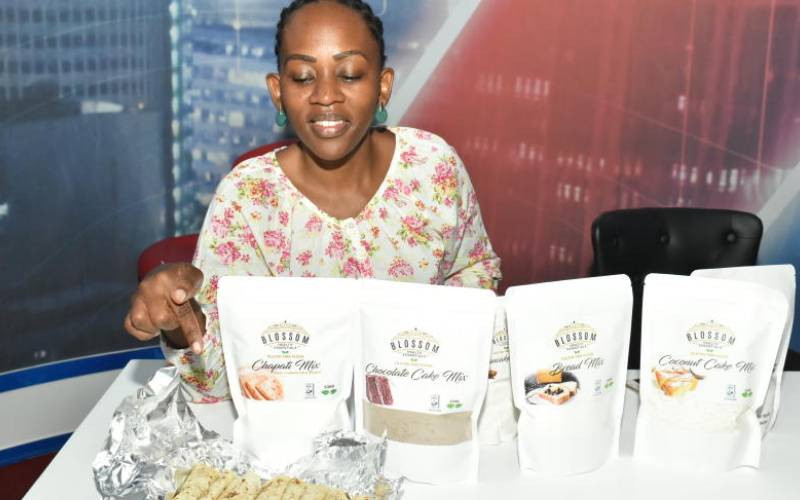
Have you ever tasted or heard of cake or chapati made out of cassava flour? Most people grew up eating cassava as a tea escort for breakfast, it would be boiled, fried, and sometimes the cassava flour would be mixed with maize flour to make porridge or ugali. But not many thought that cassava flour could be used to bake or make chapati.
Juliet Oduor, started making cassava chapati, pancakes, and cakes after she discovered her son was allergic to gluten. Gluten is a protein found in grains like wheat, barley, and rice. Gluten can trigger an autoimmune response or other symptoms including bloating, diarrhoea, and constipation.
"My son had to go gluten-free 8 years ago, that time gluten-free wasn't a buzzword as it is now, so you could only find the products at health stores and they were very expensive, you spend a lot of money and the recipe does not work out," she says
After doing research, Juliet discovered gluten-free flours locally that were mostly used for porridge.
"My child had many allergies so sometimes when invited to parties I had to pack his food. So at times people would want to taste maybe the gluten-free chapati or cake and that is when I started getting orders from family and friends," she says
SOURCE OF CASSAVA
My company is based in Siaya. There is a lot of cassava in Siaya however, it is considered a poor man's crop.
"Most people don't grow cassava because there's no market for it. So I wanted to change that narrative and offer a ready market, everyone wants to plant maize but maize doesn't do so well in Siaya. Cassava, sorghum, and millet do very well," she says
Her first products were pancake mixes, baking flour, and chapati then the others came later.
Juliet does the production from scratch, she gets the cassava from the farmers, they peel them, dry them, mill them then do different formulations and take them to the market.
"The advantages of dealing with the farmers directly are you are guaranteed the freshness of the product and also the money goes back to the farmer because they do the bulk of the work and they don't get to make the money," she says
PRODUCTS
They make around 1000 kg per week, and sell up to 3,000kg per month.
The price ranges from sh180 which is the plain cassava flour (1kg) to sh550 for the mixes.
Some of the products include Coconut cake mix containing cassava flour, coconut, baking powder, and sugar. You just add the liquid ingredients.
SUCCESS
"The main success is being able to have my own place to do production because working in a shared facility was a challenge at times you cannot produce on demand," she says
Farmers have taken up cassava farming and it is beneficial to them because they are now able to take their kids to school.
Cassava has become an alternative source of food, for parents with gluten-intolerant children.
"Another success is developing the products from 1 product to seven, improving on our packages, initially I used to work alone but now we are 5," she says
CHALLENGES
Juliet says farming is on the decline, more farmers are needed to grow the crop. Also, more farmland is needed.
"We have smallholder farmers, maybe the largest is around 1 acre. We need more farmland and more farmers and onboarding a new farmer is quite expensive because they do not have access to financing so they want to be financed and as a company, we are not able to finance them," she says
Another challenge is that the current drought has led to declined production.
"Our value chain is fragmented there's no clear structure, as an agro processor I still have to go farmer and buyer aggregation. We really need to find partners at the sourcing level," she says
Juliet says another challenge is getting distributors who are willing to work with small businesses.
 The Standard Group Plc is a multi-media organization with investments in media
platforms spanning newspaper print
operations, television, radio broadcasting, digital and online services. The
Standard Group is recognized as a
leading multi-media house in Kenya with a key influence in matters of national and
international interest.
The Standard Group Plc is a multi-media organization with investments in media
platforms spanning newspaper print
operations, television, radio broadcasting, digital and online services. The
Standard Group is recognized as a
leading multi-media house in Kenya with a key influence in matters of national and
international interest.
